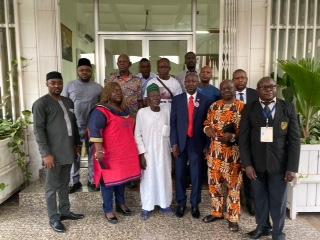The Acting Chairman of Nigeria’s Economic and Financial Crimes Commission (EFCC), Mr. Ibrahim Magu and President Alpha Condé of Guinea have reached an agreement that will see the EFCC assist Guinea to establish an anti-corruption agency.
The agreement was reached on Monday in Conakry, the Guinean capital following President Conde’s invitation to Magu and the request for EFCC’s assistance in establishing an anti-corruption agency in his t country.
A statement by the spokesman of the EFCC on Tuesday in Abuja, said that President Conde lauded the success stories of the EFCC in the fight against corruption in Nigeria and that it was its success story that informed the choice of the EFCC as a mentor organization for his country’s anti-corruption agency.
It added that apart from the meeting with Conde, the EFCC Chairman held meetings with leading figures in the Guinean economy towards the proposal.
They included Namory Camara, managing director of the country’s agency in charge of private investment, Dr. Mohamed L Doumbouya, the ministerial advisor in charge of financial institutions, Gabriel Courtis, minister of Investment and Kouyaté, special adviser to President Conde.
Magu, the statement noted, also held a meeting with officers from the different law enforcement agencies of Guinea that included Colonel Camara Tregbore, secretary general of Guinea’s High Crimes Commission.
The statement quoted Magu as saying in his address to law enforcement officers of Guinea that collaboration in the fight against corruption was needed.
He also called for anti-corruption sensitisation of Guineans, assuring that language difference between Guineans and Nigerians would not constitute a barrier in the project execution, as EFCC’s staff would be available for translation and interpretation at the EFCC Academy, where the Guinean anti-corruption officials would be trained.
It added that Magu commended President Conde’s initiative, saying that “the body language of the president is enough message to the people. It shows that corruption will not be tolerated in Guinea”.
GIK/APA


